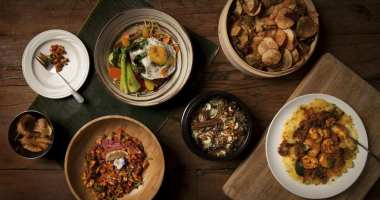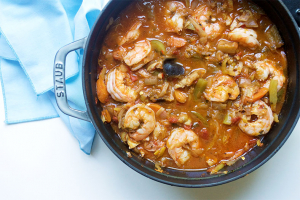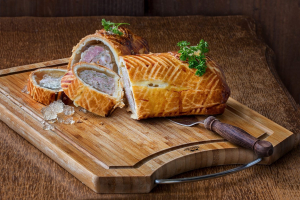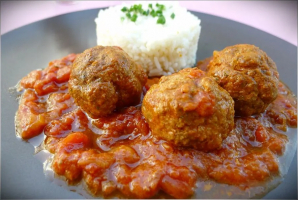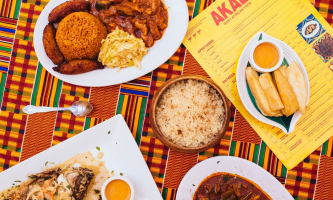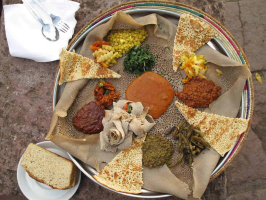Top 10 Best Foods in Portugal
Portuguese cuisine, which is known for its abundance of seafood, spices, and olive oil, is significantly influenced by the Atlantic Ocean and the produce ... read more...farmed throughout the country. Whole octopus drizzled in olive oil, soups bursting with beans and pork, and francesinha sandwiches blown up with coin-size chorizo pieces may all be found on a trip to Portugal. Corner shops advertising bacalhau swimming in olive oil and bite-size egg custards softly sprinkled with powdered sugar along the cobblestone alleys of Lisbon, Portugal's capital. On any vacation to Portugal, you must sample the most popular and well-known cuisine and desserts.
-
Caldo Verde, the famous Portuguese soup, comes from the north of Portugal. This is one of Portugal's most popular soups and dishes.
While Caldo Verde soup is very popular in the winter, you may eat it any time of year, regardless of the weather. The soup is green in hue, and it's cooked with a dark green cabbage that's hard to come by outside of Portugal. Collard greens or kale are good substitutes. This tasty and substantial soup is finished off with wonderful flavors from a blend of potato puree, chouriço sausage slices, and local Portuguese olive oil.
Caldo Verde has been enjoyed by the Portuguese on various occasions. The soup is simple, flavorful, and has a variety of textures. Basically, yes. It’s looked upon by most as the unofficial national dish of the country. It’s served through the entire country–from high-end restaurants to simple home kitchens.
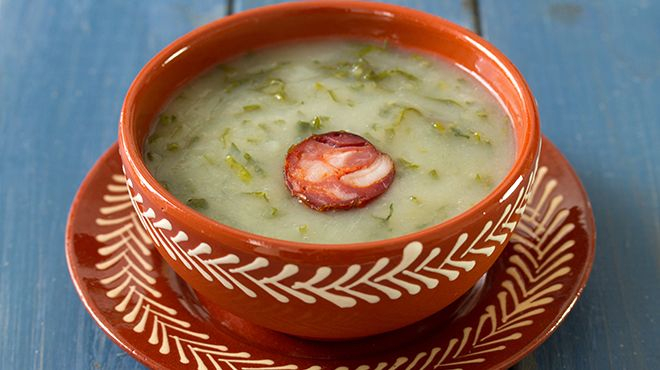
Caldo Verde 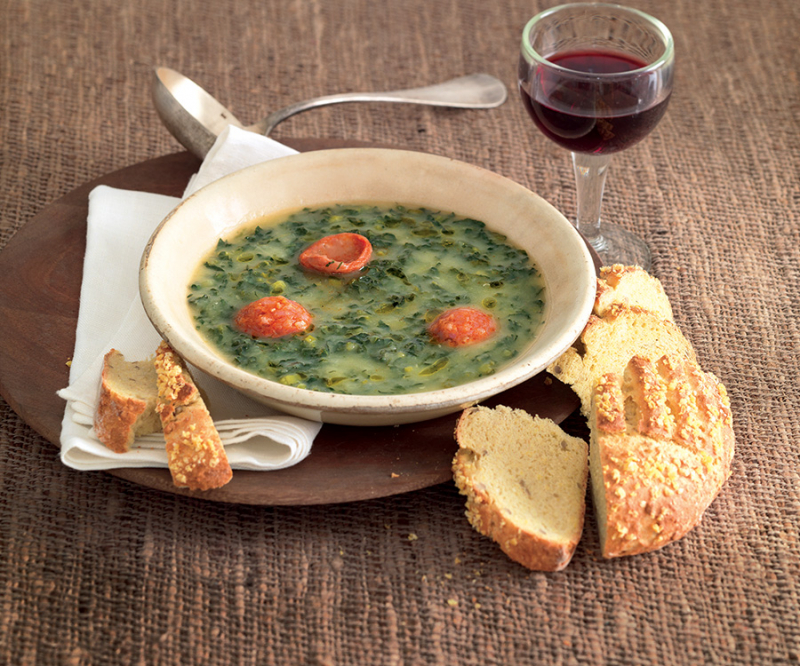
Caldo Verde -
Bacalhau is a type of dried fish that has a specific place in Portuguese cuisine. The fish is taken in Norwegian Sea waters, then sliced, salted, and dried. Norway and Iceland are Portugal's primary suppliers. Portugal is the world's largest consumer. This dish was a true nutritional breakthrough. People established an extraordinarily extended shelf life by drying and salting fish, allowing them to be transported from fishing sites to Portugal (which took up to 3 months).
Portuguese codfish can be prepared in a variety of ways. You'll discover grilled, baked, canned, and fried foods to suit your tastes. Bacalhau à brás is the most popular codfish preparation. This is a very popular codfish and egg scramble. It's cooked with thin codfish strips, potatoes, eggs, onions, garlic, and olives, then garnished with chopped parsley.Similarly, even the same food can be prepared very differently in different parts of the country. Fresh or fresh-frozen cod does not have the same flavor as Bacalhau. As a result, substituting frozen cod for the ingredients will result in a completely different dish. This is one of the most traditional Portuguese dishes that you should not miss while visiting Portugal.
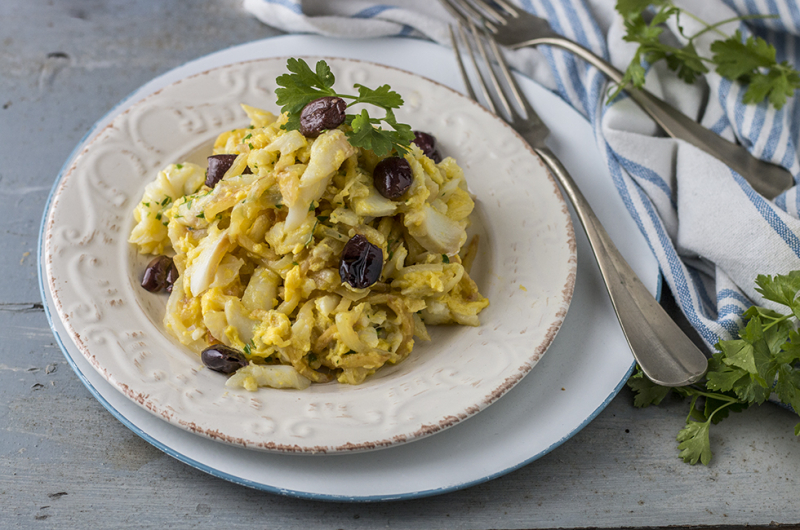
Bacalhau 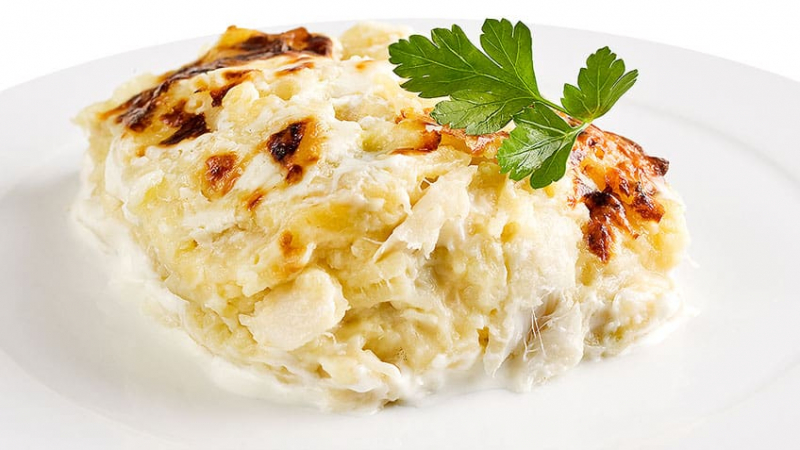
Bacalhau -
Grilled Portuguese sardines, also known as sardinhas asadas, are a popular summer dish in Portugal. The fragrance of grilled sardines pervades the streets of Lisbon for the entire month of June. That's when Lisbon stages the world's most popular sardine festival. On June 12th and 13th, the Day of Saint Anthony or Santo António Festival honors grilled Portuguese sardines. Following that, the Festas de Sardinha season begins across the rest of Portugal, with sardines being celebrated at a number of summer festivals.
The greatest time to eat fresh Portuguese sardines is between June and August, when they are at their optimum. The most typical way to serve this fish is on top of a slice of bread because the bread soaks up the fatty fat from the sardines, which gives it its distinct flavor. Moreover, the Portuguese, in a similar spirit, serve them with lemon, roasted potatoes, and peppers. Sardines are eaten straight from the charcoal grill when they are still fresh, marinated in Portuguese olive oil and served with salads, rice, or potatoes.
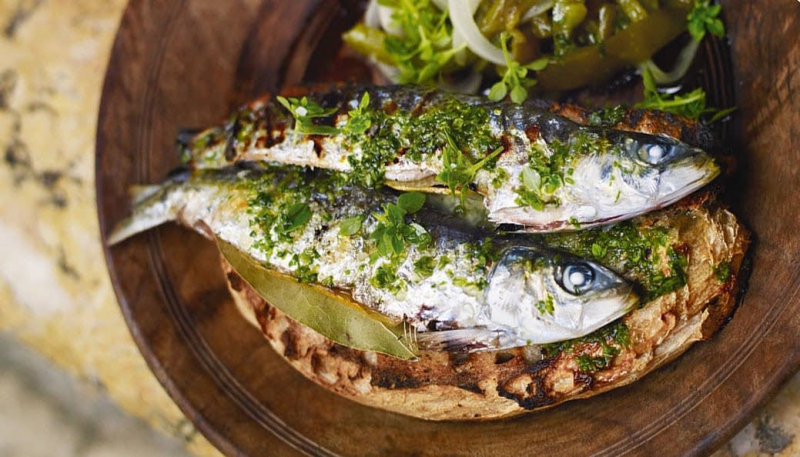
Grilled Portuguese sardines 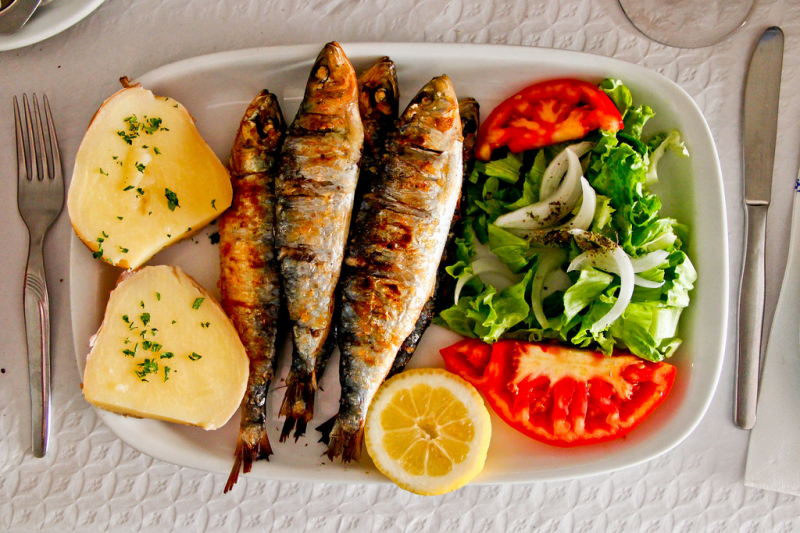
Grilled Portuguese sardines -
Bifanas are typical Portuguese pork sandwiches that are so popular that they can be found all around the country.
The luscious marinated pork in these Portuguese sandwiches is served on crunchy white bread. Paprika, garlic, and white wine are among the ingredients used in the marinade. On the outside, the bread has a crunchy crust, while the inside is mushy.
At lunch or supper, Bifanas can be served with a bowl of soup and fries for a complete meal. Alternatively, it can be served with beer for a traditional late-night Portuguese snack. The Bifanas Portugal sandwiches come in a variety of flavors. You can make your sandwich more filling by adding eggs, bacon, lettuce, and tomatoes, or you can keep it simple.
Each restaurant that serves Bifanas will have its own marinade recipe. Vendas Novas, a small village in the Alentejo region halfway between Lisbon and Evora, is reputed to have invented the original Bifanas Portugal recipe. Despite the fact that little is known about the original recipe, every Bifanas eatery claims to provide their unique rendition.
Be mindful of the serving amounts, even if they are considered a light Portuguese snack. Consider it a complete meal when served with French fries.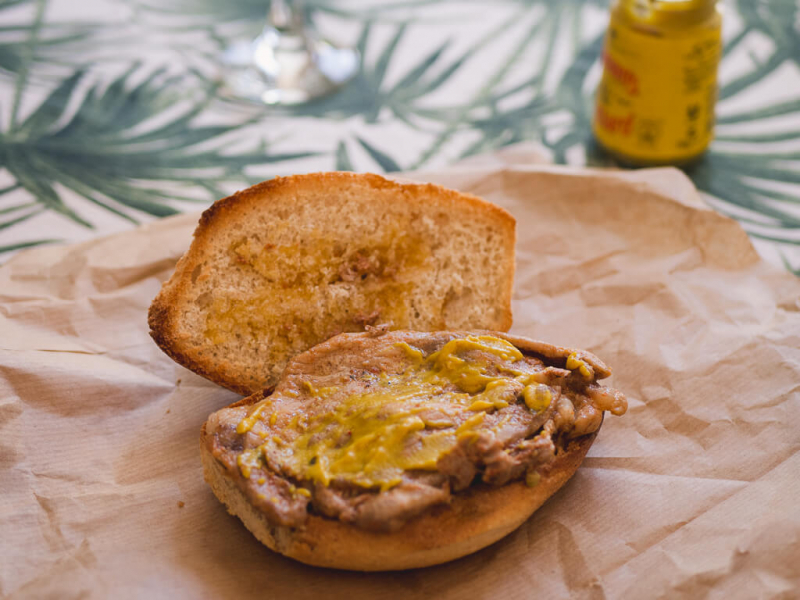
Bifanas 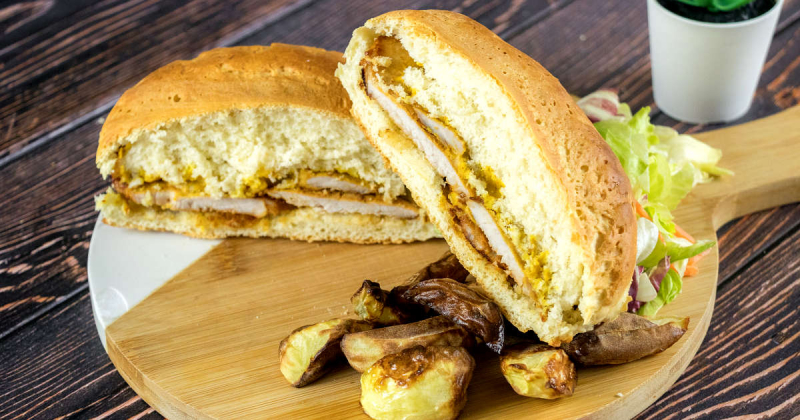
Bifanas -
The Francesinha sandwich is a beautifully presented sandwich that will make your "heart sing." It is quite popular in Porto and can be found on practically every menu. The sandwich is often made with bread, ham, sausages, and steak, and it is topped with melted cheese and an egg. Francesinha is a Portuguese word that means "little French girl." It is thought to have been brought to Porto by a returning immigrant from France. This sandwich is based on the croque-monsieur, a toasted French sandwich.
The secret sauce, which each restaurant produces in its own unique way, is what distinguishes the francesinha. A spicy, thick tomato and beer sauce is generally used to dip or "flood" your sandwich. This popular Porto dish comes with a side of french fries and is high in calories, thanks to the combination of meats, cheese, and sauce. It's extremely hefty, yet it's surprisingly enjoyable. This is a flavorful Portuguese sandwich from Porto to enjoy in moderation.
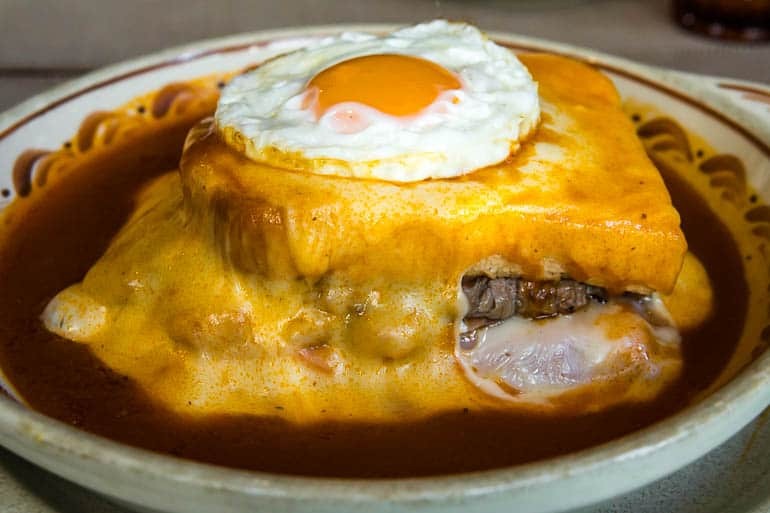
Francesinha sandwich 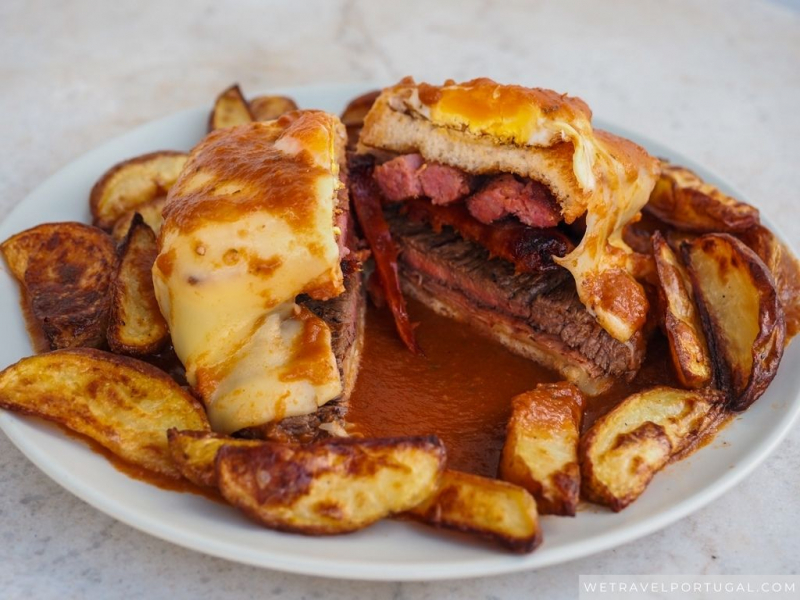
Francesinha sandwich -
Portuguese explorers sailed over coastal Africa during the Age of Exploration in the 15th and 16th centuries, discovering several new spices. A little fiery chili pepper known as Piri-Piri, Peri-Peri, or "African devil" was one of the spices.
A traditional Portuguese meal is Chicken Piri-Piri. Whole grilled and charred chicken pieces are generally wrapped in a chili-based paste or sauce. African Bird's Eye Chili is used in the sauce or paste, which is grown throughout northern Africa and southern Portugal. Piri Piri sauce is spiciness, sweetness, saltiness, and complexity all rolled into one. It's like a mini-flavor explosion in your mouth. The char from the griddle pan is what gives this chicken its distinctive flavor. It tastes like BBQ chicken, but it's even better. Chicken Piri-Piri served with chips or french fries, as well as a tiny lettuce, tomato, and onion salad.
You want to eat the chicken with your hands, which is called frango in Portuguese. A fork and knife are not used by the locals. The chicken is chopped up in such a way that you can easily tuck in and receive all the juicy pieces that are around the bones.

Chicken Piri-Piri 
Chicken Piri-Piri -
The excellent seafood in Portuguese cuisine is well-known. Apart from bacalhau (Portuguese codfish) and sardines, polvo (octopus) is another popular Portuguese seafood dish. Polvo à lagareiro is a traditional Portuguese seafood meal made with boiled and baked octopus, crushed potatoes, and garlic oil. Though many claim the cuisine comes from the Beiras, a region of land between the Douro River and the Tagus River, polvo à lagareiro is a typical supper on many tables across the country.
Polvo à la lagareiro is a deceptively easy yet delicious dish. When cooked properly, octopus becomes extremely delicate and tasty. The Portuguese olive oil gives this fish dish a distinct fruity and slightly bitter flavor. With this popular Portuguese dish, you’ll find yourself enjoying octopus as you’ve never before. The octopus is usually served with boiled potatoes in this traditional Portuguese dish. The octopus and potatoes are both baked and roasted.
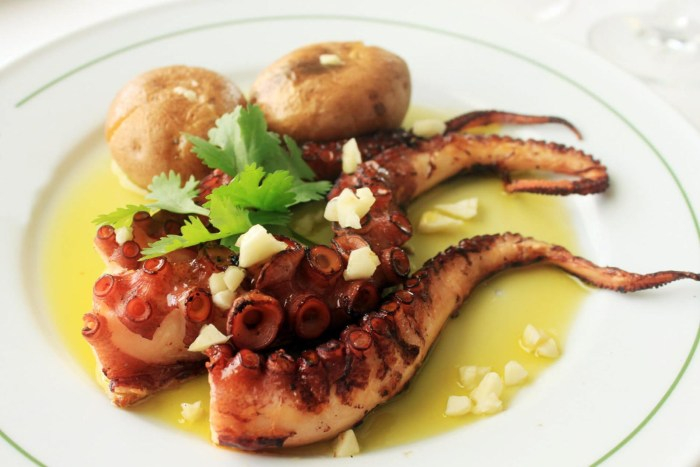
Polvo à la lagareiro 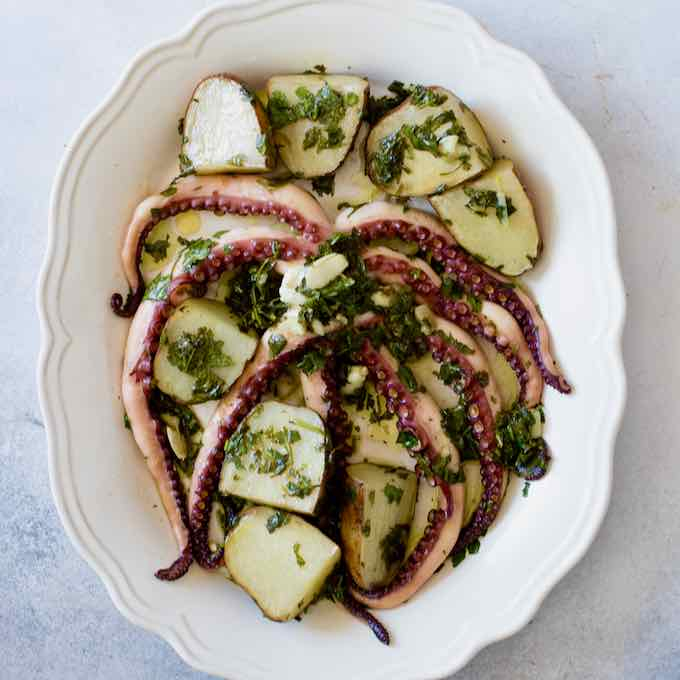
Polvo à la lagareiro -
Jamon Iberico de Bellota from Spain is one of the most costly cured hams in the world. What is less well known is that the identical pigs can be seen in Portugal's Alentejo region, which is just across the border from Spain. The pigs are known as Iberico pigs in Spanish, and some are farmed in Portugal's Alentejo province. The pigs are known as raça Alentejana across the border in Portugal. The pigs are free to roam the countryside, munching cork and holm oak acorns.
The black pigs of Alentejo create wonderful Portuguese ham with unique aromas. Don't miss the outstanding Porco Preto on your trip to Portugal. Pork dishes from Portugal can be found on restaurant menus and in dishes such as plumas or secretos (pork shoulder). It's also a popular tapas dish in Portugal, known as presunto.
The Portuguese eat their meat in a variety of ways, from charcuterie (presunto ibérico) to grilled secretos (a fattier, pork belly–like cut) to enchidos (pork sausages), but nothing compares to the slow-cooked version at Évora's Taberna Tpica Quarta Feira in the interior region of Alentejo—the heart of pork country. In this small, family-run restaurant, luscious, acorn-fed pig is roasted in its own juices for hours (think carnitas if you're familiar with the Mexican delicacy) and served all-you-can-eat style.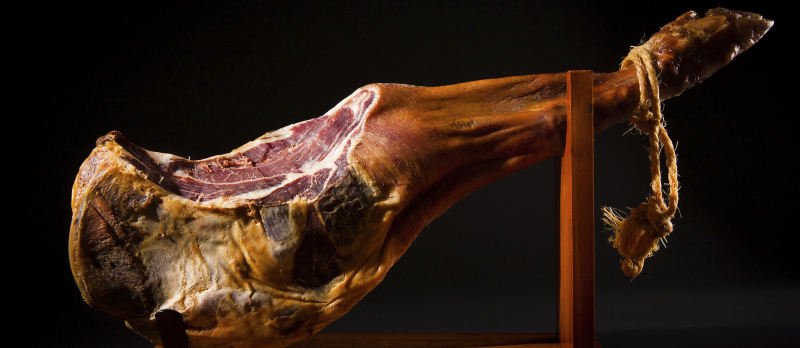
Porco Preto 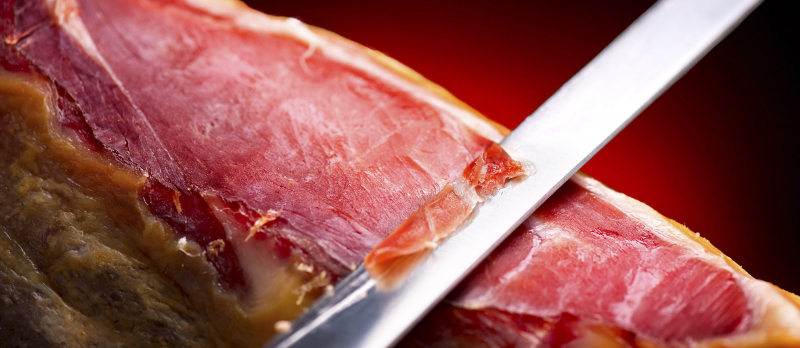
Porco Preto -
The iconic and well-known Portuguese dessert is Pastel de Nata or Pastéis de Natas (plural). Every Pasteleria or pastry store has its own take on Pastel de Nata. This sweet and creamy Portuguese egg tart is so delicious that it may become your new favorite pastry.
Monks from the Jerónimos Monastery in Santa Maria de Belem devised the pastel de nata in the 18th century. It was customary practice at the time to starch nuns' habits with egg whites, which naturally left the monks with a lot of leftover yolks. They began making them into delightful two-bite custard tarts to use them up. Fábrica de Pastéis de Belém, which is located near the monastery where the tarts were invented, claims to be the only site in Portugal that serves the original recipe.
Pastel de Nata is created using flour, butter, eggs, cinnamon, and sugar. The dough is stacked with a lot of butter, which gives the shells a crispy and cracking aspect. After that, the dough is cut into small pie shells and filled with the egg custard filling. Pastel de nata is served warm from a very hot oven with a small strong cup of Portuguese coffee, known in Lisbon as bica. One bite into this crispy, creamy sweet custard, dusted with cinnamon, will make your eyes roll in delight.
"A bride who eats a pastry will never take off her ring," says an old Portuguese proverb. As a result, it's not uncommon to see newlyweds stopping at Fábrica de Pastéis de Belém for a delicious pastry (or two) for good luck.

Pastel de Nata 
Pastel de Nata -
The most popular Portuguese desserts, aside from Pastel de Nata, are what the Portuguese refer to as conventual desserts. Conventual desserts are pastries that were traditionally cooked at convents and monasteries using a lot of egg yolks and sugar. Almonds and cinnamon are two more typical ingredients. Traditionally, egg whites were used to starch the priest's and nun's clothes in convents. With only the egg yolks and a limited amount of time to kill, the nuns had to think outside the box. In Portugal, making the most delectable and well-known deserts has become a tradition. As a result, each city and region has its own conventual desserts, which compete for the title of best-in-class Portuguese desserts.
You may try the Queijadas de Sintra in Sintra and compare the flavors to the Queijadas de Evora in Evora. The classic Tbias de Braga, a puff pastry filled with a soft sweet creamy paste and dusted with powdered sugar, is available in Braga. Sericaia, a traditional Alentejano dessert from the Convents of Elvas, a city east of Évora, may be found throughout Alentejo. Portugal has no shortages of conventual desserts. Rest assured you find one, or possibly two, to satisfy your sweet cravings.
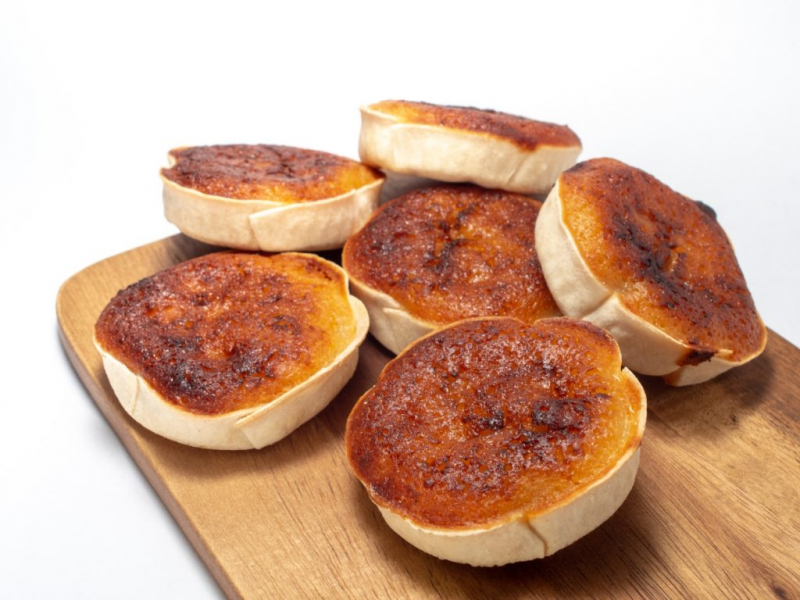
Queijadas de Sintra 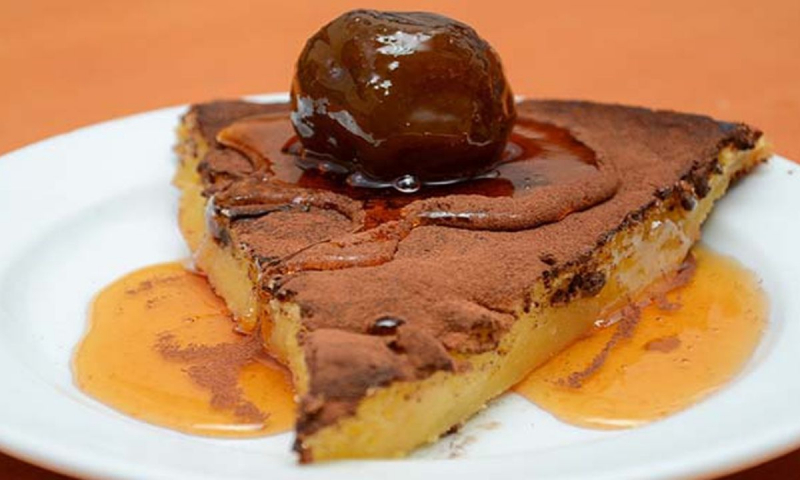
Sericaia















